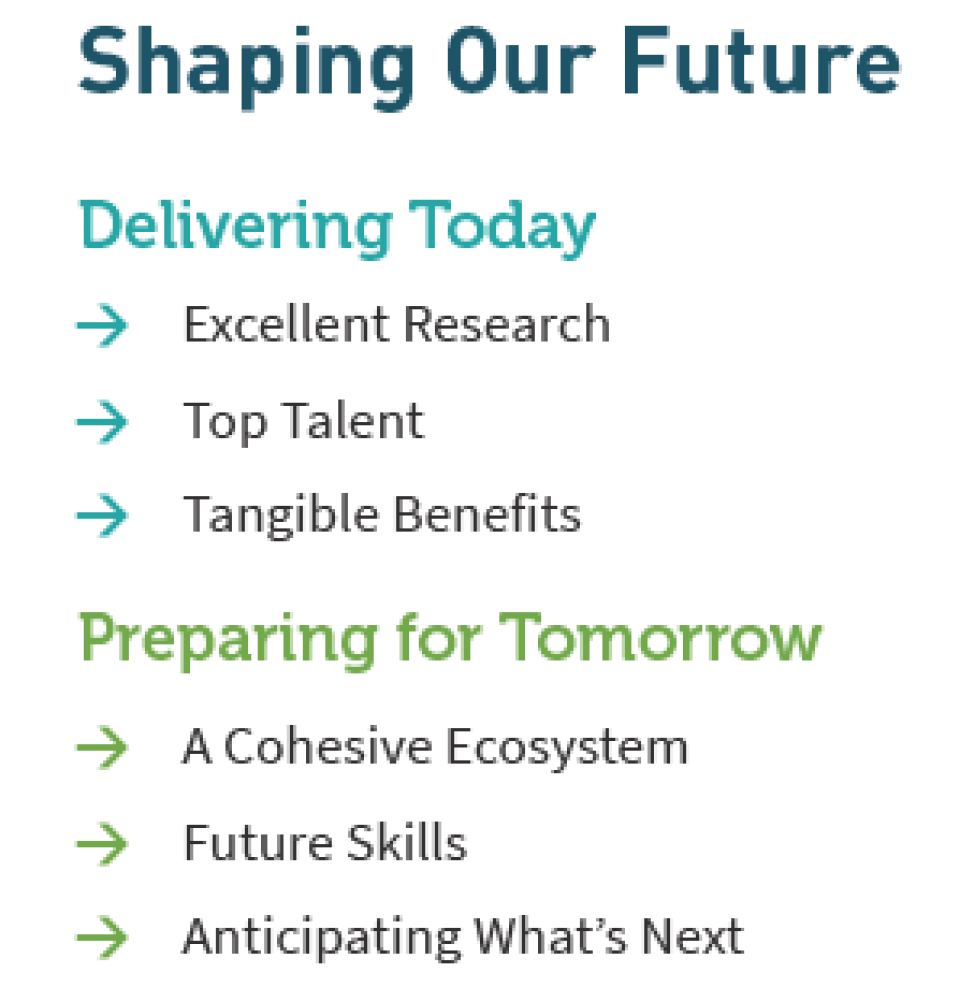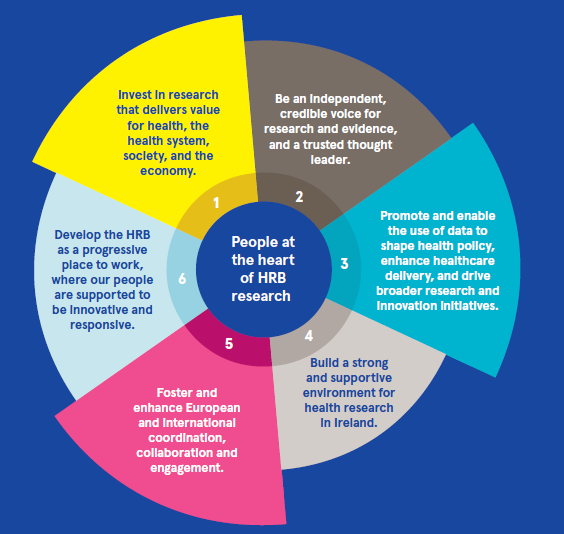
Research Newsletter - Issue 63: Spotlight
Spotlight on the Strategic Plans recently launched by SFI, HRB and Wellcome
In recent months, key funders such as Science Foundation Ireland (SFI), the Health Research Board (HRB) and Wellcome have revised their funding strategies. This spotlight will outline some of the key developments in these strategies, which provide particular insight into funder priorities and objectives over the period, and in turn flag developments in how calls may be run and evaluated in the coming years.
Click on each funder below to find a concise summary of each strategy:
SFI have recently launched the SFI Strategy 2025, ‘Shaping our Future’ which replaces Agenda 2020 (2013 to 2021) a strategy which was heavily influenced by the budgetary constraints of the last recession. The new strategy follows the move of SFI from their previous governmental department, the Department of Enterprise, Trade and Employment to the newly formed Department of Further and Higher Education, Research, Innovation and Science, and as such significant changes have been expected.

SFI Themes
The delivery of this strategy is built around six themes each with its own set of actions:
Notable developments in the current strategy
- SFI signals the intent to increase its investment in frontiers research, and pledged to fund up to 140 individual-led awards per year creating ‘a competitive frontiers capacity for Ireland’. Also in common with the HRB below, the SFI strategy recognises the need to ‘rebalance’ the funding portfolio to increase the number of researchers supported by personal awards from bottom up funding applications.
- SFI have already indicated that they will expand their process of coordinating funding calls with other funders such as the IRC. One rationale for this would be process-based, in that it may increase efficiencies. In recent years, the lack of coordinated activity between funders such as the IRC and SFI have resulted in years where there were no calls for emerging researchers (SIRG or the IRC starter Laureate for instance). This action could contribute to preventing this and allowing a more system wide coordination of funding opportunities. This is exemplified by the upcoming SFI/IRC Pathway Programme call for postdoctoral researchers, which is due to launch shortly, and will be a single call run for applicants in either the AHSS or STEM research domains, which will replace the SFI SIRG call and represents a new offering from the IRC.
- SFI will encourage and promote increased engagement with stakeholders such as the Technical Universities and Institutes of Education. This is exemplified by the recently launched Frontiers for Partnerships Programme.
- One strategic theme ‘A cohesive Ecosystem’ is dedicated to articulating steps to increase engagement with the public and other stakeholders at all levels of the funding process, from the identification of priority research areas, to inclusion of stakeholders in aspects of the research process. This theme includes an action indicating that there may be increased incentives and requirements for researchers to engage ‘early and often’ with stakeholders and to include such engagements in applications in the future.
- The strategy reaffirms the commitment to Research Centres and lists an action to ‘reimagine the next evolution of the Research Centre model by introducing all-island Research Centres; seeding new proto-centres; and merging existing centres, where warranted, into larger scale independent research institutions.’ The introduction of ‘proto-centres’ in the future would be a valuable opportunity for existing strong collaborative groupings in DCU to target to consolidate and scale their research activities.
- To address the theme of ‘what is next’ SFI intend to carry out research horizon scanning processes, and to harness data analytics to identify emerging areas of science, and understand where SFI can contribute to Irelands future economic and societal needs. This theme also describes ambitions to expand multi-disciplinary research, and new disruptive innovation schemes using accelerated alternative processes to fund research in areas of importance to Ireland’s economy and society.
SFI Annual Plan
In parallel, SFI have released their Annual Plan for 2021 which outlines the planned funding calls that will be run in the coming year. The Annual Plan is intended to align closely with a number of key objectives from the strategy. These are:
- Balancing the portfolio between investigator led and research centres, across all career levels and ranging from frontiers to applied research.
- Continued focus on SFI Research Centres.
- Ongoing support for education and public engagement.
- Continued International collaboration with overseas funders.
The HRB Strategy 2025 sets out how the HRB will advance health research, data and evidence to benefit Ireland’s people, society and economy and articulates a commitment ‘to ensuring that research and evidence are translated into important breakthroughs that improve people's health, deliver new treatments and inform health policy and practice.’
The HRB Strategy includes six strategic objectives as are briefly outlined in the figure below. These objectives broadly reflect previous areas of strategic importance in the HRB 2016-2020 strategy. However, these areas have been reframed to place greater focus on key priority areas for HRB over the next 5 years. These include having the HRB recognised as a credible voice for research and evidence in the Health space; the promotion and use of data to shape health and other social policies; building a strong supportive environment for health research in Ireland, and enhancing European and international collaboration and engagement.

A summary of the six strategic objectives of the HRB 2025 Strategy
Notable developments in the current strategy
- In common with the SFI strategy there is an increased emphasis on partnership with stakeholders across the spectrum, with the research community and with other research organisations both nationally and internationally. They also flag increasing engagement with other funders to facilitate dialogue on key issues and agendas in order to ensure stronger collaboration, coordination and prioritisation. This echoes SFI’s statement in this space and suggests greater coordination on funding calls in the future.
- The HRB wishes to further build its role as an independent, credible voice for research and evidence, and a trusted thought leader. HRB will broaden their efforts in providing evidence based information for health policy, through developing and supporting activity in evidence synthesis by Irish researchers. They aim to have a greater level of knowledge and awareness of the importance of evidence synthesis among the public, healthcare institutions, policy-makers, clinicians and researchers on the island of Ireland.
- The HRB has put the use of data to shape health policy as one of their key objectives in this strategy. The implications for researchers may include increased emphasis on best practices and standards in data management and governance by researchers, but will also likely lead to opportunities for funded research, and increased resources in areas of data analysis and synthesis in health.
- HRB also highlight their intent to balance their support of both research that informs decisions and actions in the health and social care system, with high-quality, investigator-initiated research for society and the economy.
Wellcome recently launched a new strategy which completely revamps their whole approach to funding, providing a more streamlined approach to calls and objectives. The new strategy is focused on a broad programme of discovery research and three worldwide health challenges: mental health, infectious disease, climate, and health. In line with this new strategy, they have launched a new set of funding schemes. All discovery research across humanities, social sciences and STEM will be funded through three schemes as follows:
- Wellcome Early Career Awards: for researchers within approximately three years of receiving their PhD. These awards will fund up to £400,000 over up to 5 years. There is a strong emphasis on applicants moving to a new institution for this call
- Wellcome Career Development Awards: for mid-career researchers. Applicants do not need to have an academic position and can apply for their own salary through the award. For applicants who do have a permanent position they must apply within three years of taking up that position. These awards will be for up to 8 years. There is a strong emphasis on host institution commitment to the careers of those funded by these awards.
- Wellcome Discovery Awards: for experienced individual researchers or collaborative projects. These awards will be for up to 8 years
Projects submitted to these calls are expected to focus on a bold and ambitious idea. Of note, Wellcome do not expect to fund ‘translational’ research through these schemes. While patient participation will be allowed, interventions or clinical trials will not. All Discovery research calls are expected to open in August with first deadlines in November of this year.
Specific topic-focused calls will be launched for the challenge areas identified. It is expected that ‘translational’ projects will be funded through these challenges.
Diversity and inclusion, and research culture are also central to the new strategy and will need to be embedded in all of the projects that they fund.
